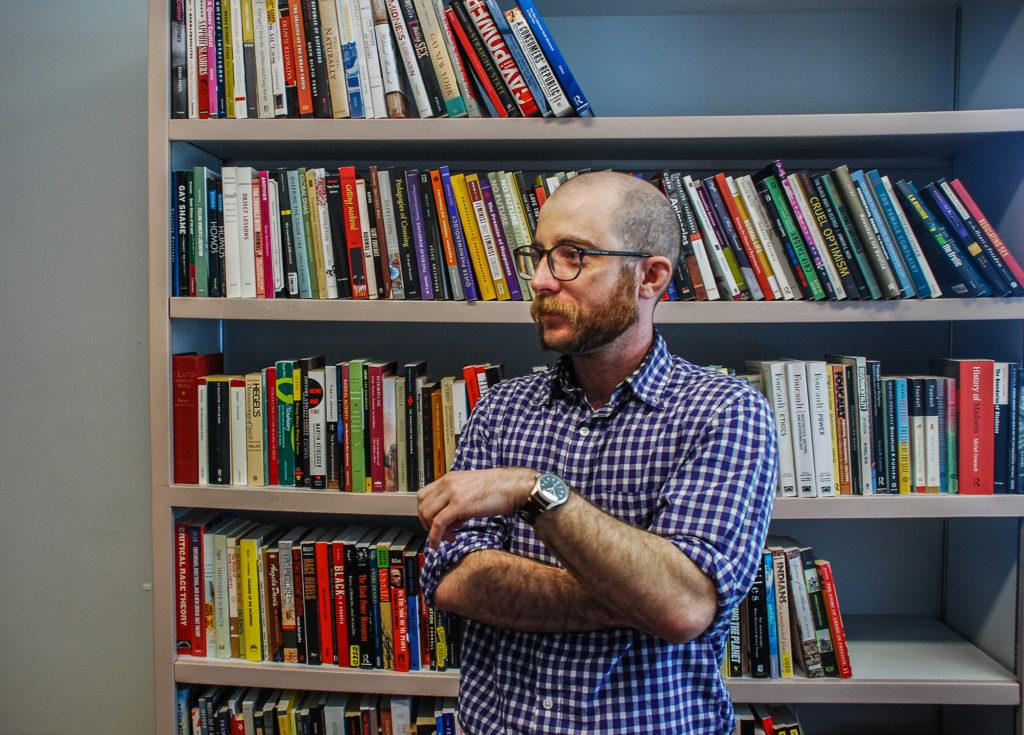For many LGBTQ+ students at Grinnell, the queer-friendly environment of the College may seem like an anomaly among a rural population often thought of as hostile to them. This semester, students in postdoctoral fellow AJ Lewis’s Queer Oral Histories course are looking to change this perception by documenting the histories of LGBTQ+ Iowa residents.
Lewis has previously conducted oral history research as a founder and coordinator of the New York City Trans Oral History Project, which documents the experience of transgender New Yorkers using a community-based, anti-oppression model. Lewis applied his experiences with the project to this course, which he is teaching for the first time this semester.
While there is an abundance of scholarship discussing LGBTQ+ oral history, Lewis structured the class so that students actively practice research methods of oral history rather than just studying it. Students have conducted interviews with approximately 40 local Iowans who identify as members or active allies of the LGBTQ+ community to amass the interviews into an archive of queer oral histories.
“Oral history has been this method for documenting the histories of marginalized groups who aren’t preserved by dominant means of [archival]. It’s been distinctly important for LGBTQ+ historians because so much of LGBTQ+ community life isn’t preserved through formal institutional mechanisms, we get preserved through medical records and legal records,” said Lewis.
Students sought out interviewees, also known as narrators, by first speaking with people at the College with local LGBTQ+ connections. From there, they were referred to community members who then recommended other narrators, a process known as snowball sampling. Interviews are mostly conversational, allowing narrators to share any experiences or stories they wish, related to their identities as LGBTQ+ Iowans.
“Writing … really disproportionately focuses on major metropolitan, mostly coastal cities … in ways that eclipse often really robust LGBTQ+ community life in other areas of the country. … That community life doesn’t always look like community life in big cities. … You get very different portraits of what LGBTQ+ experiences and issues look like when you focus on metropolitan regions,” Lewis said.
Students have involved many narrators, such as members of the Iowa Gay Rodeo Association, queer theorist Kevin Kopelson and gay country bands Lavender Country and Paisley Fields.
Evan Hurst ’21 said the class has impacted many students’ understanding of their identities as rural members of the LGBTQ+ community.
“This project has really helped me realize that Grinnell is not only gay on campus, it’s gay everywhere. … A lot of people will paint rural areas in a really negative light, but it’s been really fun to hear narrators be like ‘Yeah, I love my life here, it’s great, I have so many gay friends and a lot of accepting friends.’ … The College sphere is a lot different from the sphere that is not connected to the College, but people are still able to find their niches, and I feel like that’s kind of helpful for me and my own identity,” Hurst said.
Hannah Miller ’20 also said the intimate nature of the interviews allows for the telling of the often difficult stories of LGBTQ+ people and for a connection between interviewer and interviewee, which comprises another goal of the project: to bridge the queer community at Grinnell and LGBTQ+ people across the state.
“Getting to talk with older queer folks from another generation has been probably the most personally rewarding thing for me in this project. … I never knew any older queer folks growing up, and I feel like that’s a fairly common experience for young queers … making connections with older queer folks serves the dual purpose of helping us learn this history that we can feel connected to in some way, and also envisioning a future for ourselves which is so great,” Miller said.
On Sunday, May 12, at 3 p.m., the class will host a community forum and gathering to present the results of their project at Drake Community Library. Students and narrators will share their experiences through presentation and listening stations to provide guests with audio from the interviews. Art by young LGBTQ+ artists in the community will be on display for visitors to enjoy, as well as light refreshments. The archive is not yet complete, but progress thus far can be listened to at lgbtoralhistories.sites.grinnell.edu.
Queer Oral Histories will be offered again next spring semester. Lewis hopes to make the project an ongoing one, which students can continue to contribute to through oral history research, due to its unconventional and rewarding format.
“It’s hard for me to get excited about my own scholarship sometimes. … I really feel very fortunate, and I am trying to be very aware of the position that I’m in, getting to meet people and hear the stories of their lives and put those stories into an archive that will be here forever for other queer Iowans to listen to. … It’s been just so amazing and so rewarding to interact with real people and real stories and feel like the work that I’m doing has some real historical significance,” Miller said.


































































